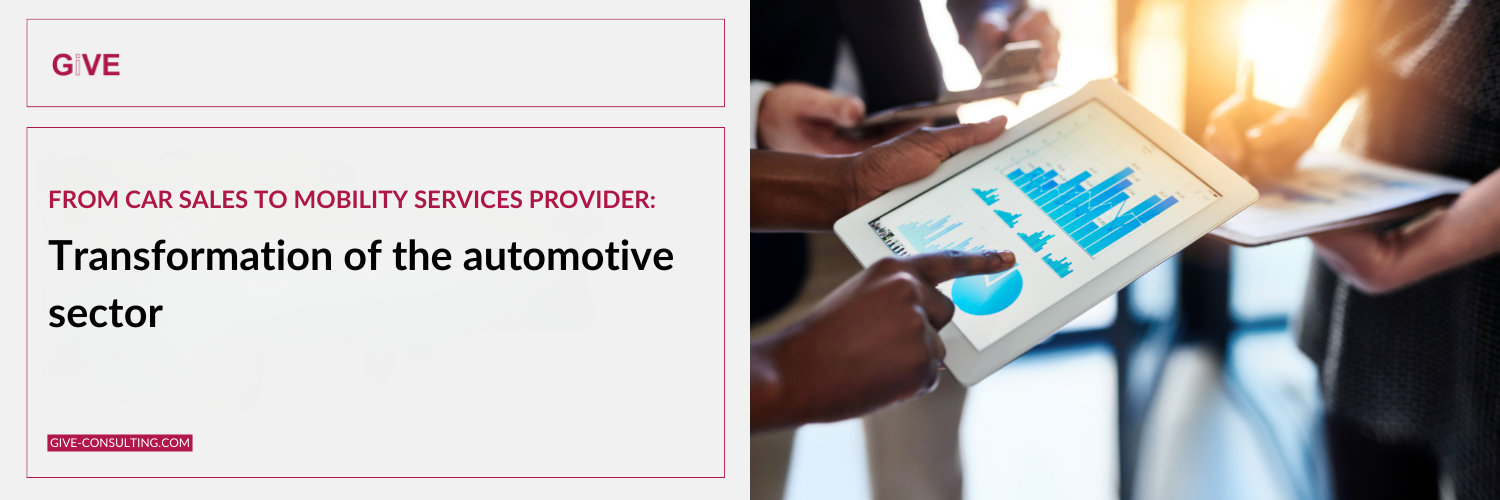Photo credit: PhotoMIX-Company für Pixabay (via Canva pro)
New business models in the automotive industry: from sales to mobility service provider
The automotive industry is currently undergoing a profound transformation that goes far beyond technological innovation.
While car manufacturers have traditionally focussed on selling vehicles, the transformation of mobility driven by new technologies and changing customer preferences is forcing the industry to rethink its business models. This change harbours not only challenges but also great opportunities, especially for companies that can adapt flexibly and in good time.
Paradigm shift: from selling vehicles to providing mobility services
The business model of car manufacturers was traditionally based on the production and sale of vehicles. These vehicles were then sold to end customers, and the life cycle of the vehicle often ended with its resale as a used car. However, this model is coming under increasing pressure.
With the rise of electric mobility, increasing urbanisation and the growing importance of sustainable mobility solutions, consumer expectations are changing. In cities around the world, car ownership is becoming less attractive, while the demand for flexible and sustainable mobility solutions is increasing. This is leading to a shift towards new business models such as car sharing, prepaid services and other mobility services.
Practical examples: how manufacturers are responding to the change
A prime example of this change is the BMW Group, which entered the car sharing market early on with its DriveNow brand. ‘DriveNow, now part of SHARE NOW, offers flexible mobility solutions in many European cities. Customers can rent vehicles spontaneously and return them at any location within the business area. With this model, BMW has reached new target groups who do not want to or cannot afford their own car, but still appreciate the flexibility of having their own vehicle.
Another example is Daimler, which has also responded to the growing demand for mobility services. With the ‘car2go’ brand, Daimler was one of the pioneers in the field of car sharing. In addition, Daimler has founded a joint venture with BMW called ‘FREE NOW’, a mobility platform that brings together various services such as taxis, car sharing and e-scooters in one application.
These examples show how companies are diversifying their traditional business models and evolving into mobility service providers to meet market demand.
The role of interim managers in the transformation
The transition to new business models requires not only technological innovation, but also far-reaching organisational changes. Companies must adapt their structures, processes and culture in order to remain agile and competitive. Dedicated interim managers are indispensable in this phase.
GiVE's interim managers have the necessary expertise and experience to support companies during this transition phase. They have in-depth industry knowledge and understand the specific challenges of the automotive industry. They work closely with management to develop customised solutions and effectively manage the implementation of new business models.
Another advantage of interim managers is their ability to step into the organisation at short notice and add value immediately. This is particularly important in times of change, when quick decisions and the implementation of measures are essential. GiVE has a reputation for providing highly skilled interim managers who are able to successfully lead and complete transformation projects.
Why companies should switch to mobility services
The shift from pure vehicle sales to mobility services offers car manufacturers the opportunity to diversify their revenues and open up new revenue streams. Rather than relying on one-off vehicle sales, companies can generate ongoing revenue by offering services that span the entire lifecycle of a vehicle.
In addition, this model enables closer customer loyalty. By providing mobility services, companies can stay in constant contact with their customers and better understand their needs. This opens up new opportunities for cross-selling and up-selling, as companies can offer customised services that are tailored to individual customer needs.
Conclusion: Shaping the future of mobility
The automotive industry is at a turning point. The shift towards new business models centred on mobility services is inevitable. Companies that adapt early and actively shape this change will not only survive, but will also be successful.
The automotive industry today is changing not only at the level of vehicle sales itself, but also in supply chain management and production processes. A global supplier of automotive components was facing serious production capacity issues and delayed deliveries to its customers. This situation was caused not only by sub-optimal production processes, but also by inadequate warehouse space and inefficient project management. GiVE Management Consulting's interim managers were tasked with bringing order to these processes and implementing solutions that would eliminate delays and provide greater production flexibility.
As part of this project, an experienced interim manager created robust scheduling tools that streamlined the delivery management process and implemented automated material flow controls. Another important step was the introduction of direct communication with key suppliers and the standardisation of production processes. As a result, the customer backlog was reduced to zero by May 2024, ensuring on-time and reliable deliveries. This case study shows how important it is to optimise production capacity and respond flexibly to new challenges in the changing automotive industry with mobility services.
GiVE's interim managers play a key role in this change. With their experience and expertise, they support companies in mastering the challenges of change and taking advantage of the opportunities that arise. In a rapidly changing world, it is important to remain flexible and adaptable - and interim managers offer exactly the support that companies need in this critical phase.
Are you ready to take the next step in the mobility revolution? Our experts are here for you. Contact us at





